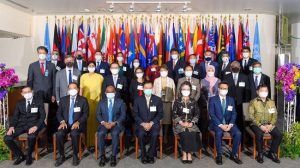The United Nations Economic and Social Commission for Asia and the Pacific (ESCAP) opened its 78th session in Bangkok, Thailand, on Monday, May 23, 2022, with global and regional leaders calling for strengthened regional cooperation and multilateralism as reverberating impacts of the COVID-19 pandemic, climate change and geopolitical conflicts threaten to derail sustainable development.

“To address systemic risks, we should understand, foresee and adapt to future shocks through strategic foresight. No one country can move forward on these development agendas alone,” said Armida Salsiah Alisjahbana, UN Under-Secretary-General and Executive Secretary of ESCAP. “All our resources and energies must be targeted and impactful while promoting rules-based, open, non-discriminatory and equitable principles and approaches.”
Ms. Alisjahbana further called for countries to focus on protecting the most vulnerable and hardest hit groups, creating resilient economic and social foundations, and prioritising sustainability at the core of all policy initiatives.
Home to two-thirds of the world’s population, the Asia-Pacific region has been the engine of the global economy and home to countless innovations that have bettered the lives of billions. While it has made significant development gains over the past decades, the vast region faces daunting challenges.
In his message, United Nations Secretary-General António Guterres underscored that ESCAP and its member States are uniquely placed to drive progress in Asia and the Pacific.
“I count on you to help reinvigorate multilateral action built on solidarity, trust and cooperation to create a greener, more sustainable and prosperous future for all,” he said.
At the opening, Abdulla Shahid, President of the United Nations General Assembly, highlighted the plight of least developed countries, landlocked developing countries and small island developing states in the region, which have been disproportionately affected by crises.
“We must do more to support these countries with finances, technology, capacity development and debt relief in their efforts to recover from the pandemic and achieve the Sustainable Development Goals,” Shahid stated.
The theme study for the 78th session describes pathways to achieve more inclusive and sustainable post-pandemic recovery and recommends four key action areas: protecting people and the planet, leveraging digital opportunities, trading and investing more together, and raising financial resources and managing debt. It underlines the crucial need to listen to the voices of women and young people, placing them at the centre of development work in the region.
The session coincides with the 75th anniversary of ESCAP. “With its establishment in 1947, the UN regional commission provided governments in Asia and the Pacific – for the first time in history – a platform to meet to discuss common economic problems, establish agreed principles of action and carry out policies determined by mutual agreement,” shared Collen Vixen Kelapile, President of the Economic and Social Council. “The region has come a long way since 1947, but the need for multilateralism and regional cooperation is as great today as it was 75 years ago.”
“ESCAP was founded amid efforts by countries in the region to rise from the ashes of war and pursue their development with the hope of lasting peace. Today, the world and the region are once again confronted with various pressing challenges, which are more diverse and complex. The hard-won peace that we have cherished is on the brink of crumbling if we do not engage in dialogue and work hand-in-hand,” said Prime Minister General Prayut Chan-o-cha (Ret) of Thailand.
“ESCAP has played a critical role in fostering cooperation amidst countries in the region. It also has been instrumental in amplifying the region’s voice in global conversations, especially on sustainable development which should remain the region’s priority,” said Thailand’s Vice Minister of Foreign Affairs Vijavat Isarabhakdi, who was elected Chair of the session.
More than 500 participants from 51 member States and associate members as well as other stakeholder groups are attending the session this week. It is expected to culminate on Friday with the endorsement of resolutions on advancing sustainable development and building a more resilient future.
